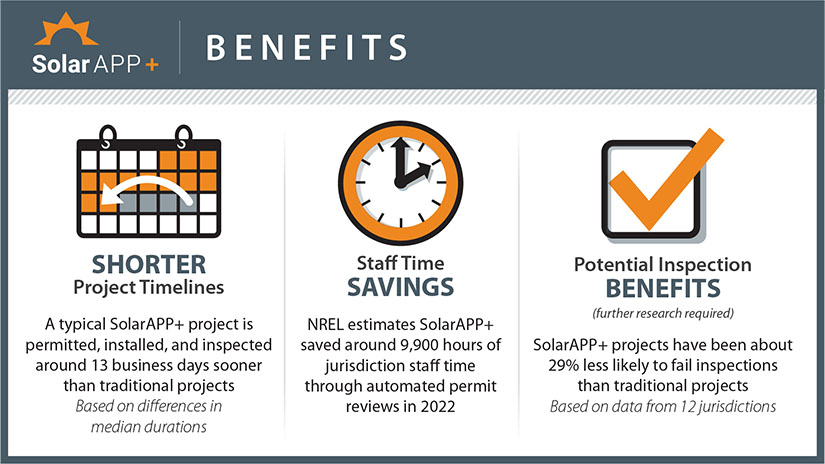Automated Permitting Speeds Solar Adoption Across United States
Communities That Used SolarAPP+ Processed More Than 11,000 Solar Permits and Eliminated More Than 134,000 Days of Delays in 2022
Most rooftop photovoltaic (PV) systems are required to go through a permitting process implemented by local authorities having jurisdiction (AHJs), such as community or county governments. As rooftop PV becomes more efficient, accessible, and prevalent, however, it is straining the capacity of AHJs nationwide to issue permits.
The Solar Automated Permit Processing Plus (SolarAPP+) software—developed by the National Renewable Energy Laboratory (NREL), in collaboration with industry and the building safety community, and with funding from the U.S. Department of Energy—eases the permitting process and cuts red tape, making it easier for AHJs across the United States to issue permits for residential PV systems and solar-plus-storage systems. With SolarAPP+, AHJs can instantly issue permits for code-compliant residential PV systems.

2022 Performance Review Demonstrates SolarAPP+ Value to Communities
NREL released its annual performance report on SolarAPP+ using 2022 data. Among the findings are these key results:
- Expanding rapidly—15 AHJs had publicly launched SolarAPP+ by the end of 2022, and 16 more were piloting the platform. Another 89 AHJs were testing or preparing to pilot SolarAPP+.
- Beyond the Sun Belt—Initially, SolarAPP+ was predominantly adopted in Arizona and California, but communities in other states, such as Connecticut, Texas, and Virginia have also implemented the tool.
- More permits—Across 31 AHJs, 206 installers submitted more than 11,000 permits using SolarAPP+ in 2022—a 300% increase over 2021.
- Shorter project timelines—A typical SolarAPP+ project is permitted, installed, and inspected approximately 13 business days sooner than projects permitted in the traditional way.
- Staff time savings—SolarAPP+ saved approximately 9,900 hours of AHJ staff time in 2022 (i.e., permitting department staff).
- No negative impact on inspections—SolarAPP+ projects were approximately 29% less likely to fail inspections than projects that were permitted the traditional way.
Why Faster Permitting Matters
Speeding up solar permitting is critical to our nation's clean energy goals. Unintentional red tape and roadblocks present challenges to the emerging rooftop PV market by increasing compliance costs and installation timelines. Worse, these barriers widely vary from one AHJ to another, creating uncertainty for homeowners and solar installers.
SolarAPP+ was developed in response to these challenges. It standardizes AHJ permitting for most residential rooftop PV systems. The platform allows PV contractors to upload system specs, have those specs automatically reviewed for code compliance, and obtain instant approval for code-compliant systems. It also generates checklists for building inspectors to confirm that installed systems match preapproved designs. The software is freely available to AHJs and is supported by administrative fees paid by installers.
In Upcoming Webinars, Hear From Communities That Use SolarAPP+ and See a Live Demonstration of Storage Permitting Software
On May 16, the International Code Council (ICC), a collaborator that helped develop SolarAPP+, will host a webinar in which building officials from four communities—Denver, Colorado; Houston, Texas; Harrisonburg, Virginia; and Guilford, Connecticut—will discuss how automated solar permitting reduced permitting timelines, freed up staff time, and helped advance their community's goals. NREL researchers will also present results from the SolarAPP+ 2022 performance review.
A second webinar will follow on June 6, providing a live demonstration of how the SolarAPP+ platform can permit residential solar and energy storage systems, too, showing how a contractor would input a system and an inspector would verify compliance in the field.
For more information:
- Read the full performance review.
- Register for the May 16 and June 6 ICC-hosted webinars.
- See where SolarAPP+ is available for use now.
- Learn about SolarAPP+.
Last Updated May 28, 2025
